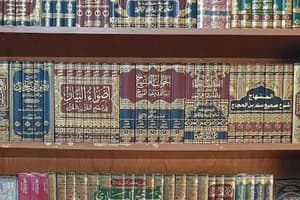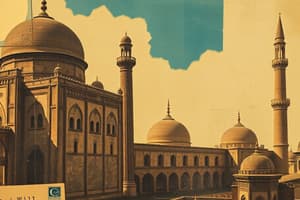Podcast
Questions and Answers
Which of the following actions best demonstrates 'Iman kepada Allah' in daily life?
Which of the following actions best demonstrates 'Iman kepada Allah' in daily life?
- Complaining constantly about misfortunes.
- Always being grateful for blessings and maintaining good conduct, believing that Allah is watching. (correct)
- Only praying when facing difficulties.
- Never helping others, as everyone has their own destiny determined by Allah.
Why is 'Amanah' considered an important characteristic in Islam?
Why is 'Amanah' considered an important characteristic in Islam?
- It allows individuals to keep secrets, even if they are harmful.
- It helps in accumulating wealth and power.
- It demonstrates honesty and trustworthiness in all aspects of life, including duties and responsibilities. (correct)
- It ensures a person only focuses on their own success.
How does 'Istiqamah' manifest the dedication of a Muslim?
How does 'Istiqamah' manifest the dedication of a Muslim?
- By avoiding challenges and focusing on personal comfort.
- By consistently doing good deeds and worship, even when facing challenges. (correct)
- By judging others for their actions.
- By only performing good deeds when it is convenient.
What is the significance of performing 'thaharah' (bersuci) in Islam before prayer?
What is the significance of performing 'thaharah' (bersuci) in Islam before prayer?
What is the main benefit of 'salat berjamaah' (congregational prayer) compared to praying alone?
What is the main benefit of 'salat berjamaah' (congregational prayer) compared to praying alone?
Why is studying the life of Prophet Muhammad SAW important for Muslims?
Why is studying the life of Prophet Muhammad SAW important for Muslims?
What does Islam emphasize regarding the pursuit of knowledge ('menuntut ilmu')?
What does Islam emphasize regarding the pursuit of knowledge ('menuntut ilmu')?
How does practicing empathy ('empati') and respect ('menghormati') benefit society from an Islamic perspective?
How does practicing empathy ('empati') and respect ('menghormati') benefit society from an Islamic perspective?
What is the deeper significance of the Hijrah (migration) of Prophet Muhammad SAW from Mecca to Medina?
What is the deeper significance of the Hijrah (migration) of Prophet Muhammad SAW from Mecca to Medina?
What is the primary characteristic that distinguishes the Khulafaur Rasyidin (Rightly Guided Caliphs)?
What is the primary characteristic that distinguishes the Khulafaur Rasyidin (Rightly Guided Caliphs)?
Why are 'Pemaaf' (forgiveness), 'Sabar' (patience), and 'Ikhlas' (sincerity) emphasized in Islam?
Why are 'Pemaaf' (forgiveness), 'Sabar' (patience), and 'Ikhlas' (sincerity) emphasized in Islam?
What is the significance of believing in the divine books (Kitab-Kitab Allah) in Islam?
What is the significance of believing in the divine books (Kitab-Kitab Allah) in Islam?
Why are 'Khamr' (intoxicants), 'Judi' (gambling), 'Pertengkaran' (quarreling), and 'Ghadab' (excessive anger) forbidden in Islam?
Why are 'Khamr' (intoxicants), 'Judi' (gambling), 'Pertengkaran' (quarreling), and 'Ghadab' (excessive anger) forbidden in Islam?
Why is 'Menepati Janji' (keeping promises), 'Rukun' (harmony), and 'Damai' (peace) valued in Islam?
Why is 'Menepati Janji' (keeping promises), 'Rukun' (harmony), and 'Damai' (peace) valued in Islam?
What is the fundamental belief that Muslims must have regarding the prophets and messengers (Iman kepada Rasul)?
What is the fundamental belief that Muslims must have regarding the prophets and messengers (Iman kepada Rasul)?
Why does Islam emphasize proper procedures of managing the body of the deceased?
Why does Islam emphasize proper procedures of managing the body of the deceased?
How does 'Husnudzon' (positive thinking) affect a Muslim’s behavior and attitude?
How does 'Husnudzon' (positive thinking) affect a Muslim’s behavior and attitude?
What is the primary purpose of fasting (Puasa) in Islam?
What is the primary purpose of fasting (Puasa) in Islam?
Why does Islam encourage Muslims to consume ‘halal’ and ‘thayyib’ food?
Why does Islam encourage Muslims to consume ‘halal’ and ‘thayyib’ food?
What was a significant contribution of the Daulah Abbasiyah to the world?
What was a significant contribution of the Daulah Abbasiyah to the world?
How should belief in the Day of Judgment (Iman kepada Hari Akhir) influence a Muslim's life?
How should belief in the Day of Judgment (Iman kepada Hari Akhir) influence a Muslim's life?
According to Islamic law, what is the correct procedure for slaughtering animals for food?
According to Islamic law, what is the correct procedure for slaughtering animals for food?
What is the purpose of Qurban and Aqiqah in Islam?
What is the purpose of Qurban and Aqiqah in Islam?
What are the essential conditions for performing Salat (prayer) in Islam?
What are the essential conditions for performing Salat (prayer) in Islam?
How do Ikhlas (sincerity), Sabar (patience), and Pemaaf (forgiveness) contribute to a Muslim's character development?
How do Ikhlas (sincerity), Sabar (patience), and Pemaaf (forgiveness) contribute to a Muslim's character development?
What were the main characteristics of the era of the Khulafaur Rasyidin (Rightly Guided Caliphs)?
What were the main characteristics of the era of the Khulafaur Rasyidin (Rightly Guided Caliphs)?
What does belief in Qada and Qadar (divine decree and destiny) require of a Muslim?
What does belief in Qada and Qadar (divine decree and destiny) require of a Muslim?
How does exhibiting good manners and etiquette ('Tatakrama') in daily life reflect one's faith in Islam?
How does exhibiting good manners and etiquette ('Tatakrama') in daily life reflect one's faith in Islam?
When are cultural traditions acceptable in Islam?
When are cultural traditions acceptable in Islam?
When facing a difficult situation, how should a Muslim act according to teachings of 'Sabar' (patience)?
When facing a difficult situation, how should a Muslim act according to teachings of 'Sabar' (patience)?
Which action exemplifies the correct understanding of 'Ikhlas' (sincerity) in Islamic teachings?
Which action exemplifies the correct understanding of 'Ikhlas' (sincerity) in Islamic teachings?
How can communities promote harmony by reflecting belief in 'Damai' (peace)?
How can communities promote harmony by reflecting belief in 'Damai' (peace)?
Why does Islam emphasize 'Menepati Janji' (Keeping Promises)?
Why does Islam emphasize 'Menepati Janji' (Keeping Promises)?
When is it important to practice 'Pemaaf' (Forgiveness)?
When is it important to practice 'Pemaaf' (Forgiveness)?
What are the benefits of the traditions of 'Maulid Nabi'?
What are the benefits of the traditions of 'Maulid Nabi'?
Who are some of the notable figures from the Daulah Abbasiyah?
Who are some of the notable figures from the Daulah Abbasiyah?
What guidance does Islam provide in responding when things don't go as you planned?
What guidance does Islam provide in responding when things don't go as you planned?
Flashcards
Iman kepada Allah
Iman kepada Allah
Firm belief that Allah SWT is the one God, Creator, and the Sustainer of the universe.
Jujur
Jujur
Speaking and acting in accordance with the truth; reflects a pure and sincere heart.
Amanah
Amanah
Being trustworthy and reliable in what is entrusted; includes property, secrets, and tasks.
Istiqamah
Istiqamah
Signup and view all the flashcards
Bersuci (Thaharah)
Bersuci (Thaharah)
Signup and view all the flashcards
Salat Berjamaah
Salat Berjamaah
Signup and view all the flashcards
Sejarah Nabi
Sejarah Nabi
Signup and view all the flashcards
Menuntut Ilmu
Menuntut Ilmu
Signup and view all the flashcards
Empati
Empati
Signup and view all the flashcards
Menghormati
Menghormati
Signup and view all the flashcards
Hijrah Nabi Muhammad SAW
Hijrah Nabi Muhammad SAW
Signup and view all the flashcards
Khulafaur Rasyidin
Khulafaur Rasyidin
Signup and view all the flashcards
Pemaaf
Pemaaf
Signup and view all the flashcards
Sabar
Sabar
Signup and view all the flashcards
Ikhlas
Ikhlas
Signup and view all the flashcards
Iman kepada Kitab-Kitab Allah
Iman kepada Kitab-Kitab Allah
Signup and view all the flashcards
Khamr
Khamr
Signup and view all the flashcards
Judi
Judi
Signup and view all the flashcards
Pertengkaran
Pertengkaran
Signup and view all the flashcards
Ghadab
Ghadab
Signup and view all the flashcards
Menepati Janji
Menepati Janji
Signup and view all the flashcards
Rukun
Rukun
Signup and view all the flashcards
Damai
Damai
Signup and view all the flashcards
Iman kepada Rasul
Iman kepada Rasul
Signup and view all the flashcards
Pengurusan Jenazah
Pengurusan Jenazah
Signup and view all the flashcards
Husnudzon
Husnudzon
Signup and view all the flashcards
Amal Shalih
Amal Shalih
Signup and view all the flashcards
Puasa
Puasa
Signup and view all the flashcards
Makanan Halal
Makanan Halal
Signup and view all the flashcards
Daulah Abbasiyah
Daulah Abbasiyah
Signup and view all the flashcards
Iman kepada Hari Akhir
Iman kepada Hari Akhir
Signup and view all the flashcards
Penyembelihan Hewan
Penyembelihan Hewan
Signup and view all the flashcards
Qurban
Qurban
Signup and view all the flashcards
Aqiqah
Aqiqah
Signup and view all the flashcards
Shalat
Shalat
Signup and view all the flashcards
Ikhlas, Sabar, and Pemaaf
Ikhlas, Sabar, and Pemaaf
Signup and view all the flashcards
Tatakrama
Tatakrama
Signup and view all the flashcards
Iman kepada Takdir
Iman kepada Takdir
Signup and view all the flashcards
Study Notes
- The text provided includes a comprehensive explanation of 28 Islamic topics.
- These were originally extracted from a lesson plan.
Iman kepada Allah (Faith in Allah)
- Belief in Allah is not just verbal, but must be reflected in actions and in the heart
- Belief in Allah includes believing in His existence, oneness (tauhid), and perfect attributes
- Daily examples of faith in Allah include being grateful, not despairing when afflicted, and guarding behavior as if always watched by Allah
- Believers strive to avoid prohibitions and carry out commands like prayer, charity, and doing good
Sifat Terpuji: Jujur, Amanah, Istiqamah (Exemplary Traits: Honesty, Trustworthiness, Steadfastness)
- Jujur (Honest) means speaking and acting truthfully, reflecting a pure and integral heart; Prophet Muhammad was called Al-Amin for his honesty
- Amanah (Trustworthy) means being reliable in all entrusted matters, like possessions, secrets, or tasks; a trustworthy person fulfills their responsibilities.
- Istiqamah means steadfastly doing good despite challenges, signifying sincerity in worship and good deeds.
- Examples of applying these traits include telling parents your actual exam score, delivering a friend's message correctly, and praying five times a day even when busy.
Bersuci (Thaharah) (Purification)
- Purification in Islam involves cleansing oneself from hadas (ritual impurity) and najis (physical impurity) to validate worship, especially prayer.
- There are two types of hadas: minor (cleaned by wudu) and major (cleaned by mandi junub/ritual bath); Najis refers to impurities that must be cleansed from the body, clothes, or place of worship.
- It is obligatory for a Muslim to perform wudu (ablution) before prayer
- Wudu comprises washing the face, hands, head, and feet; those who experience wet dreams must perform mandi junub.
- Personal hygiene entails keeping nails clean, cleaning the mouth (siwak), and maintaining a clean environment.
Salat Berjamaah (Congregational Prayer)
- Salat berjamaah involves performing prayers together, led by an imam
- Congregational prayer is more virtuous than praying alone, with rewards increased by 27 degrees
- It strengthens Islamic brotherhood, trains discipline, and promotes solidarity.
- Actions such as praying the five daily prayers in the mosque with family exemplify the practice
- The Imam should have the best Quranic recitation and proper understanding of prayer procedures
- Worshippers must follow the imam’s movements and not precede them
- It cultivates a sense of togetherness and purity of heart.
Sejarah Nabi (Prophet's History)
- Studying the Prophet Muhammad's life is important to emulate his character and struggles
- He was born in Mecca in 571 AD, descending from the Bani Hashim family
- Even from childhood, he demonstrated honesty, courage, and a kind heart
- Upon receiving the first revelation in the Cave of Hira, he was tasked with conveying Islamic teachings to humanity.
- When harmed by the Quraysh, he responded with kindness
Menuntut Ilmu (Seeking Knowledge)
- Islam emphasizes the importance of seeking knowledge
- The acquisition of knowledge is obligatory for every Muslim
- Knowledge in Islam includes both religious and beneficial general knowledge
- This is because with knowledge, people can distinguish between right and wrong and also correctly practice religious obligations
- Learning the procedures of prayer to worship correctly or studying mathematics and science to benefit society are key
- Knowledge elevates a person's status in the eyes of Allah
Empati dan Menghormati (Empathy and Respect)
- Empati involves feeling and understanding the emotions of others; Islam encourages people to care for one another, mainly those in hardship.
- Menghormati (Respecting) entails valuing others, irrespective of age or status.
- Examples of empati include comforting sad friends and helping neighbors affected by misfortune
- Examples of respect include not scolding parents, listening when teachers speak, and behaving politely towards friends
Hijrah Nabi Muhammad SAW (Prophet Muhammad's Migration)
- Hijrah was the migration of Prophet Muhammad from Mecca to Medina
- It was driven by the need to save the Islamic mission from oppression
- Hijra signifies a transformation to a better state, symbolizing a new approach not just a change of location
- In Medina, the Prophet established a peaceful, just, and tolerant society
- A key moment was when Abu Bakr accompanied the Prophet during the journey
Khulafaur Rasyidin (The Rightly Guided Caliphs)
- The Khulafaur Rasyidin were the first four caliphs after the Prophet Muhammad's death: Abu Bakr, Umar bin Khattab, Utsman bin Affan, and Ali bin Abi Thalib
- Abu Bakr was known for his courage in defending Islam and compiling the Quran, Umar for his firmness and justice, Uthman for spreading copies of the Quran, and Ali for his deep knowledge
- They serve as models for Islamic leadership.
Sifat Pemaaf, Sabar, dan Ikhlas (Traits of Forgiveness, Patience, and Sincerity)
- Being Pemaaf (Forgiving) means being willing to pardon others' mistakes, which reflects a generous heart and avoids grudges
- Being Sabar (Patient) is about enduring trials, difficulties, or temptations; patience is crucial in worship
- Ikhlas (Sincere) involves doing something solely for Allah, without seeking praise – These traits are essential for success in this world and the afterlife.
Iman kepada Kitab-Kitab Allah (Belief in the Books of Allah)
- Muslims must believe in the divine books revealed by Allah as guidance, which include the Torah (Nabi Musa), Psalms (Nabi Daud), Gospel (Nabi Isa), and Quran (Nabi Muhammad)
- The Quran confirms and completes previous scriptures
- Actions include revering holy books of all Abrahamic faiths and making the Quran the primary guide in life.
Khamr, Judi, Pertengkaran, Ghadab (Intoxicants, Gambling, Arguments, Wrath)
- Khamr includes all types of intoxicants which are prohibited in Islam because they harm the mind and body
- Judi is games of chance that rely on speculation and harm people
- Pertengkaran damages relationships, causing hatred and division
- Ghadab refers to excessive, uncontrolled anger that can drive negative actions.
- Examples: Avoiding alcohol, not participating in harmful wagering, and controlling anger in misunderstandings
Menepati Janji, Rukun, Damai (Fulfilling Promises, Harmony, Peace)
- Menepati Janji (Fulfilling Promises) is a characteristic of the faithful, while breaking promises is condemned
- Living in harmony and peace are ideals; Islam promotes unity and respect.
- Actions such as keeping appointments
Iman kepada Rasul (Belief in the Messengers)
- Belief in the Messengers means believing that Allah sent prophets and messengers to convey His revelations
- Actions include emulating Prophet Muhammad's character (such as honesty and compassion)
Pengurusan Jenazah (Managing the Deceased)
- Managing the deceased in Islam includes bathing, shrouding, praying over, and burying the body
- These processes are completed with respect and follow religious guidelines
- In Islam, the dignity of humans, living even, is always respected
Akhlak Terpuji: Husnudzon & Amal Shalih (Exemplary Morals: Positive Thinking & Righteous Deeds)
- Husnudzon is having positive assumptions about Allah and others, preventing quick judgment or suspicion
- Amal shalih encompasses all good deeds done with intention for Allah and according to religious guidance
- Examples include helping parents, aiding friends in need, and protecting the environment
Puasa (Fasting)
- Fasting means abstaining from eating, drinking, and bad deeds from dawn till dusk with the intention for Allah
- Fasting involves self-discipline, controlling desires, and increasing devotion
- Examples include controlling anger during fasting, providing meals to others, and reading the Quran.
Makanan Halal & Thayyib (Halal & Thayyib Food)
- Halal food is that which is allowed by Islamic law, while Thayyib means good, healthy, and not harmful to the body
- Islam forbids harmful food such as carrion, blood, pork, and alcohol
- Actions include consuming only nutritious and safe foods.
Daulah Abbasiyah (Abbasid Dynasty)
- The Daulah Abbasiyah was an Islamic caliphate established after the fall of the Umayyad Dynasty around 750 AD
- Its capital was Baghdad
- The Abbasid era was the golden age of Islam that saw advancements in science, philosophy, medicine, mathematics, and art.
Iman kepada Hari Akhir (Belief in the Day of Judgment)
- Belief in the Hereafter means recognizing that this world will end and humans will be resurrected to account for their deeds
- The final day is known as "Hari Kiamat"
- Actions include consistently being cautious in actions
Penyembelihan Hewan (Animal Slaughter)
- Animal slaughter should happen following Islamic law
- Rules include saying bismillah, having a sharp knife, and severing breathing & food channels
- Slaughter must be on halal animals i.e. like sheep, cows, goat and chickens
Qurban dan Aqiqah (Sacrifice and Aqiqah)
- Qurban means sacrificing animals (cows, goats, camels) during Idul Adha as compliance with Allah
- Aqiqah is sacrificing animals as a form of gratitude for a child’s birth
- Qurbans are performed during Eid al-Adha, and the meat is shared with the poor
- Aqiqah is done after a child's birth as thanks
Shalat (Prayer)
- Salat are obligatory prayers five times a day
- Salat strengthens one's connection with Allah and distances bad behaviour
Ikhlas, Sabar, dan Pemaaf (Sincerity, Patience, and Forgiveness)
- Ikhlas are deeds done solely for Allah
- Sabar demonstrates strength to face troubles
- Pemaaf brings peace and maintains solidarity
Khulafaur Rasyidin (The Rightly Guided Caliphs)
- Four key leaders of Islam after Muhammad were Abu Bakar, Usman and Ali
- The period was known for prosperity in adhering to Islamic purity
Iman kepada Takdir (Belief in Fate)
- Takdir is the decree of God that applies to all
- Takdir Mubram can not be changed and covers things like death
- Takdir Muallaq can be influenced by how a person lives life, for example, work hard and do well
Qada and Qadar Definitions
- Qada and Qadar are core parts of iman
- Qada means the final decree of Allah from pre-existence
- Qadar is the demonstration of Allahs qada
Tatakrama (Etiquette)
- Tatakrama refers to ethics and etiquette in behaviour
- Tatakrama upholds social connections in harmony
Tradisi Islam (Islamic Traditions)
- Traditions of Islam are habits which contain teachings of Islam such as maulid Nabi
- During the celebration of Muhammad's birth there are lectures and prayers
- It is essential to make sure that traditions maintain messages of the core Islamic beliefs
Studying That Suits You
Use AI to generate personalized quizzes and flashcards to suit your learning preferences.




